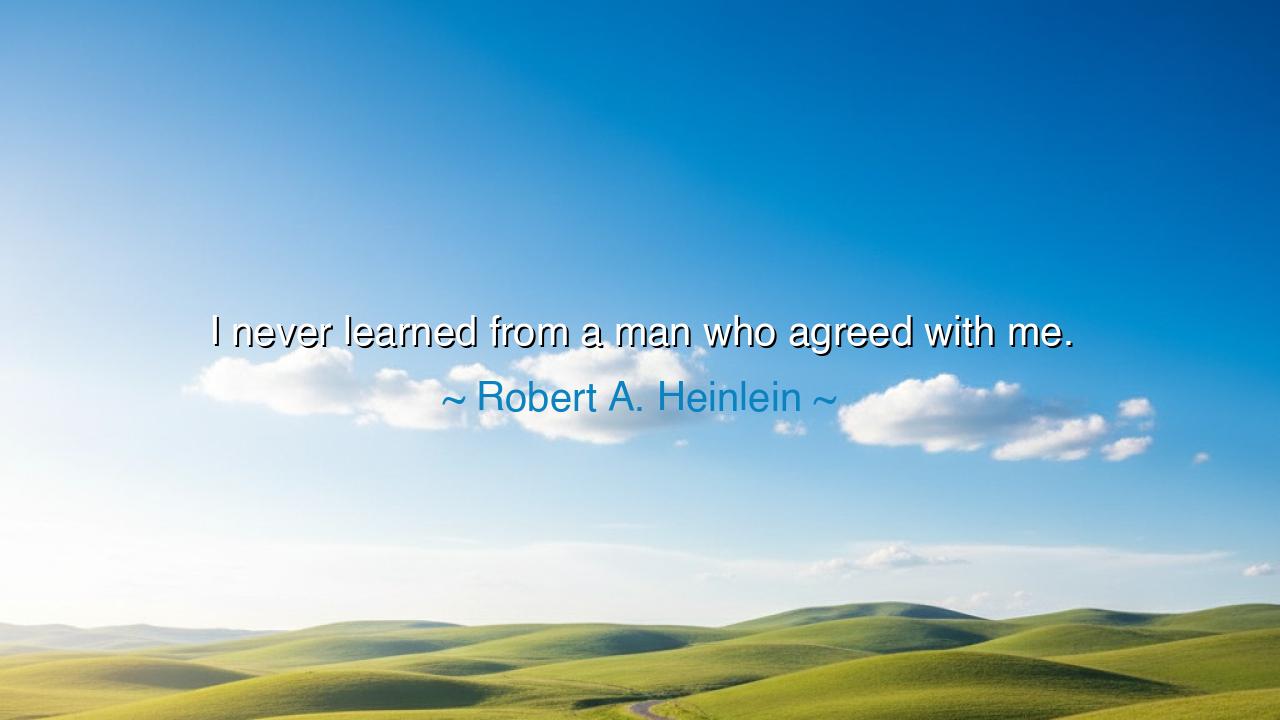
I never learned from a man who agreed with me.






The great writer and philosopher Robert A. Heinlein once said, “I never learned from a man who agreed with me.” Though his words were spoken in the modern age, they carry the fire of ancient truth. For what he meant is this: wisdom is born not from agreement, but from challenge. When others nod to our every thought, our mind lies still, content in its own shadow. But when another stands before us and says, “You are wrong,” then the spirit awakens, the sword of intellect is drawn, and from that clash of ideas, the sparks of understanding are struck.
The human heart longs for harmony, but the human soul hungers for growth—and growth is born from conflict, not comfort. To be surrounded only by those who agree with us is to live in a garden without wind, where nothing takes root deeply. Yet when we walk among those who question, who dispute, who push against our beliefs, we are forced to test our thoughts, to strengthen them or surrender them. Thus disagreement, though uncomfortable, is sacred—it is the hammer that forges truth from raw opinion.
Heinlein’s wisdom echoes the teachings of the ancients. The philosopher Socrates built his life upon the art of questioning. He sought out not those who flattered him, but those who argued, who challenged, who forced him to uncover the reasons behind his beliefs. Through this dialogue—through friction and contradiction—truth emerged, bright and sharp as a blade honed by stone. His student, Plato, recorded those very exchanges, and from them rose the foundations of Western thought. Had Socrates sought only agreement, philosophy itself would have been stillborn.
History, too, teaches us that disagreement is the mother of progress. When Galileo looked to the heavens and declared that the Earth was not the center of the universe, he defied the greatest powers of his age. The world called him heretic; the Church silenced him. Yet through that storm of opposition, the human mind broke free from the chains of ignorance. Galileo did not learn from those who agreed with him—they only praised what he already knew. He learned, instead, from his conflict with those who denied him, for their resistance forced him to prove, to question, to perfect his truth. The same fire that burned against him became the light that led humanity forward.
To learn from disagreement requires humility, for pride is the enemy of wisdom. When our beliefs are challenged, our first impulse is to defend them, to strike back, to protect the fragile castle of our ego. But the wise do not fear contradiction—they welcome it as a mirror. For even if our challenger is wrong, his words reveal something about our own understanding, some corner of thought we have not yet examined. The wise man listens to his opponents more closely than to his admirers, for the friend who agrees teaches nothing, but the adversary who argues can illuminate the truth.
The shallow mind seeks comfort in echoes; the great mind seeks truth in contrast. To sit with those who think differently—to listen without anger, to question without hatred—is the test of maturity and the path to mastery. The artist learns from the critic; the ruler learns from the rebel; the student learns from the teacher who says, “Look again.” Thus, disagreement is not division—it is dialogue, the sacred fire in which ideas are refined. The ancients called it dialectic; the moderns may call it debate. But its spirit is eternal: through opposition, understanding is born.
So, let this be your lesson: do not fear those who oppose your thoughts—thank them. Seek out the company of the bold, the questioning, the different. Listen to those whose views make you uncomfortable, for it is there that your boundaries will stretch, and your wisdom will deepen. Do not build walls of agreement around yourself; build bridges of inquiry. Speak not only to be heard, but to be challenged. For only through friction does the flint spark fire, and only through disagreement does the mind find truth.
And when at last you stand firm in what you have learned—not because others agreed, but because you have tested your truth against the world—then you will understand Heinlein’s words in full. Agreement comforts the ego; disagreement awakens the soul. Seek not to be flattered, but to be sharpened, and you shall never cease to learn.






AAdministratorAdministrator
Welcome, honored guests. Please leave a comment, we will respond soon